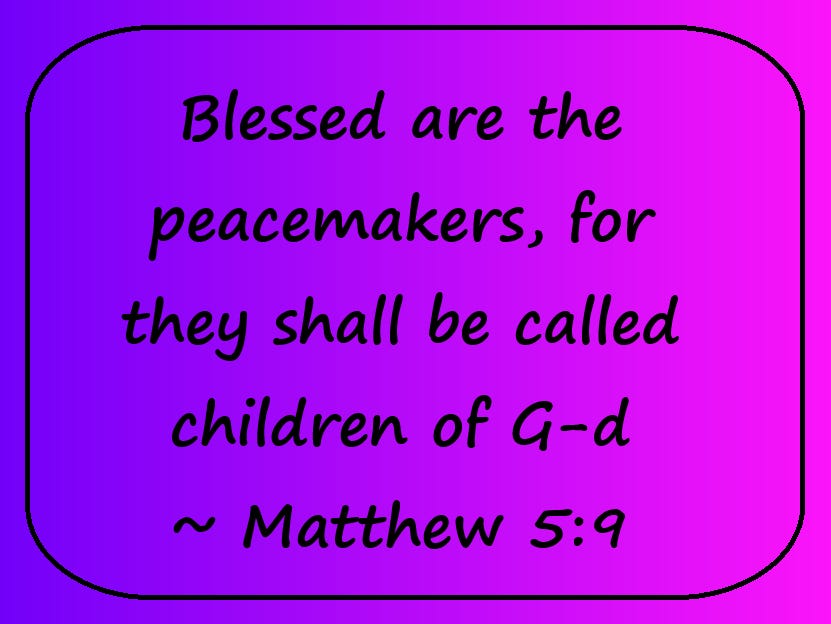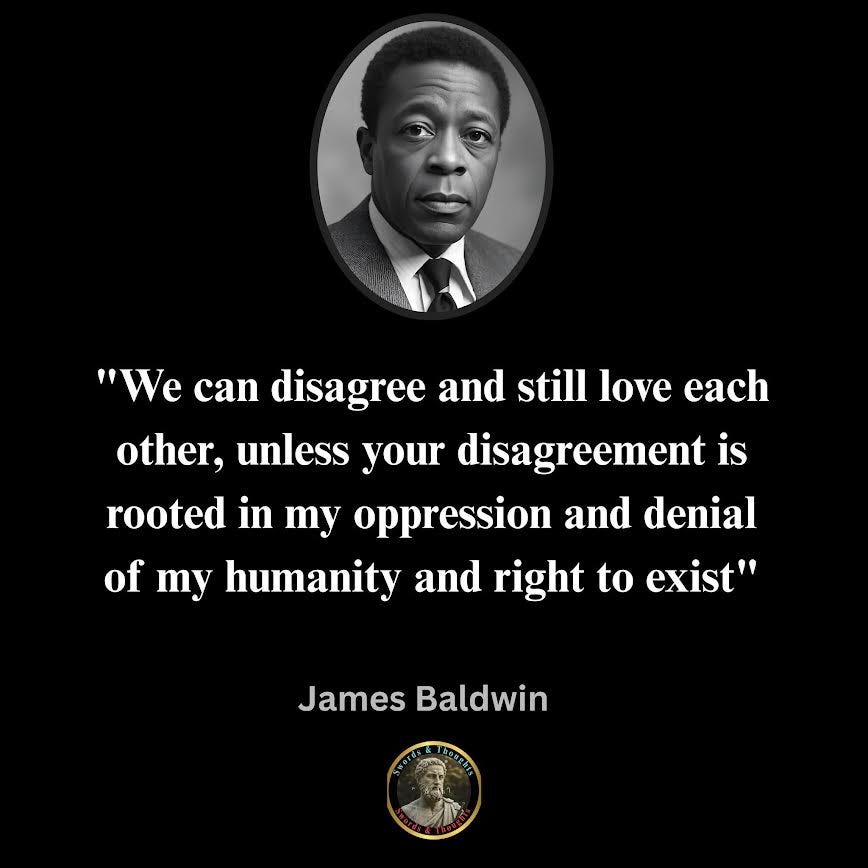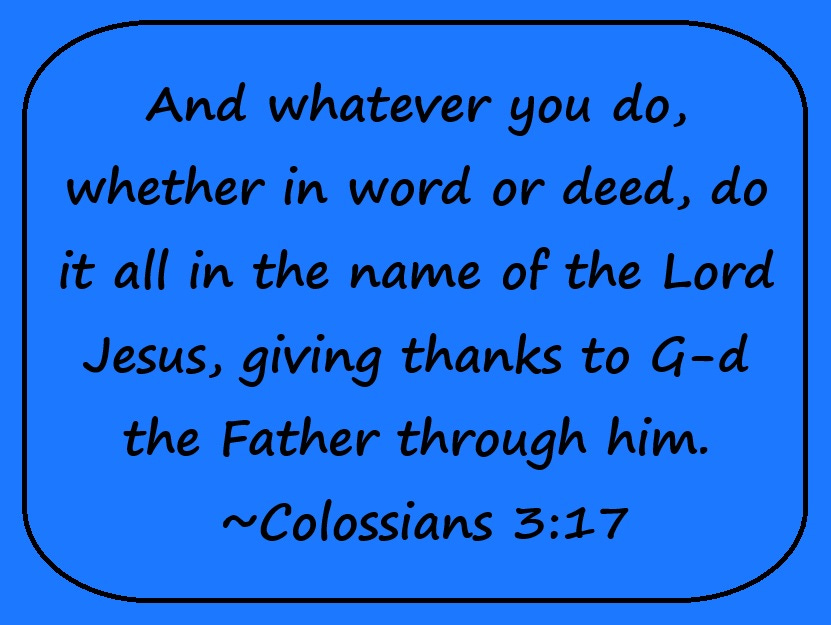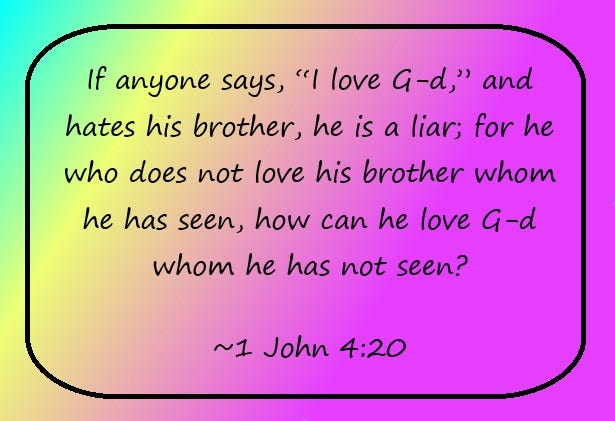Who is a peacemaker? I'll tell you who isn’t: a person who passively rolls over and accepts whatever someone wants to dish out to them or to others. It's really hard work to be a peacemaker. We might need to expose lies, cruelty, and hypocrisy to do this work. That doesn't sound very peaceful, but if it's done with empathy, humility, and forgiveness, it can result in repentance, restitution, and restoration (the 3 R's). And that's when peace can actually come to exist where it didn't exist before, out of restored relationships.
Does that mean that we must agree on everything in order to have peace with each other? No, we don't need to agree on everything to love each other and have fellowship. We can learn to tolerate differences that are not harmful to others. But as James Baldwin wrote, when our disagreement centers on the right of another to exist as G-d made them, then yes, we need to set boundaries and keep people safe. Where there is no agreement on this basic right, there can be no fellowship. Setting boundaries in this cases is not a lack of love: it's what will allow peacemaking to do its work and possibly allow forgiveness and love to emerge.
Being a peacemaker in Jesus's Kingdom does not mean that we can expect a wolf and a lamb to eat together at one table, unless the wolf has undergone the sort of transformation shown in Isaiah 11:6 (“The wolf shall dwell with the lamb”) in the restored world of the future messianic age. If we invite unrepentant, unrestored wolves to sit at the table with the lambs, we will end up seating only wolves, except for the few lambs that are foolish enough to put themselves in harm's way. Choosing to invite both, without first doing the work of peacemaking, is itself making the choice to favor the wolves.
Most, but not all, Americans want very much to live in a peaceful, fair, and just society. They also expect to be granted the freedoms outlined in the Bill of Rights, including both freedom of and freedom from religion, freedom of peaceful assembly, freedom of speech, and all the rest. These rights are our guarantors of living free from oppression, discrimination, bigotry, marginalization, and enforced beliefs. Wolves do not care about granting these rights to others.
Christian Nationalism is an example of an unrepentant wolf. There is nothing loving or Christlike about it. It is a wolf in sheep's clothing, an earthly empire draped in the trappings of Jesus's Kingdom. It's all about power and imposing its beliefs and practices on others, rather than winning them through love and service. If the lamb wants to eat at the same table with the wolf, it had better profess the wolf's beliefs and live the wolf's lifestyle. Otherwise, there is no seat for it, and only harm awaits it.
DRAWING LINES
Christian Nationalism maintains its power by constantly drawing lines for the purpose of defining the ‘in group’ that has the right beliefs and practices, excluding all those who disagree. It is extremely unChristlike. Melissa Florer-Bixler, in her book How to Have an Enemy (2021) discusses how the “powerful forces of compassion and empathy helped shift my perspective [from a conservative fundamentalist position].” She continues:
“I learned how to assess power, how it works, and who has it. And I began to see the line in the Bible that Jesus draws between himself and the powerful. Eventually I had to make a choice. I decided I would put myself on the side of the line where I saw Jesus. I was wrong about LGBTQ people. I repent of it, and the work of my life is to undo, in whatever measure I can, these past harms.” (pages 137 to 138)
This is peacemaking. Repentance, restitution, restoration.
G-d loves peacemaking. The “prove me wrong” technique beloved by many Christian Nationalists is incredibly toxic: it uses rhetorical tricks, it's disingenuous, and the videos that are released of the conversations are often highly edited. Those who employ this technique do not want to have an honest conversation. They use leading questions which force unwary people down predetermined pathways and right into rhetorical traps. They have no interest in understanding the other; they want to dominate, humiliate, and “win.” This is the exact opposite of how G-d tells us to deal with people when we are peacemaking:
Another colloquial way to frame this is “a man convinced against his will is of the same opinion still.”
In 1 Corinthians 8:1, the apostle Paul states “...knowledge puffs up, but love builds up.” Melissa Florer-Bixler, in the same book cited above (pages 142 through 147), explains that Paul was urging the divided church in Corinth (divided by class) that even if you have the “correct” interpretation of scripture, using your knowledge to bulldoze over other people is not love. Even if you tell yourself that you're bulldozing them for their own good, so they can have correct doctrine like you. It's still not love.
Peacemakers need to learn to draw a different type of line. Yes, opponents of Christian Nationalism and other forms of wolfish behavior also need to draw lines. Herein lies the difference: Christian Nationalism insists that the powerful need to draw lines to keep out the marginalized and maintain the purity of the cult. Followers of Jesus need to draw lines to protect the marginalized from the exclusionary powerful.
We should never be using violence, coercion, or hateful judgmental words towards the wolves in our life, under any circumstances. It doesn't matter if it's in our churches, schools, communities, or politics. Words that are intended to lead to violence are actually a part of that violence. But we also don't just passively accept the violence meted out to us or others in our sphere either. As followers of Jesus, we are called to love G-d and our neighbors, to seek peace and justice, and to reject lies, cruelty, and hypocrisy. We are only to use Christlike actions to expose those lies and all the rest: using love, empathy, service, mercy, truth telling. Leaving room for repentance, restitution, and restoration, but drawing a line if need be to protect the marginalized or vulnerable. Unrepentant wolves cannot be seated at the table.
Should we be angry about exclusionary line drawing, the marginalizing of others, the lies and injustice? Yes. Is it possible to get angry without sinning? Also yes, by always leaving room for repentance, restitution, and restoration, and by focusing more on the harm done to others than the harm done to yourself. Whatever your gifts lead you to do, do it to the glory of G-d (Colossians 3:17). If you are good with your words, channel your anger and your love for the marginalized into constructive, loving, godly rhetoric. If you have the heart of a servant, channel it into service of the marginalized. Instead of getting drawn into harmful rhetoric and doubling down on it, double down on serving the lambs who are in your sphere of influence. And perhaps on serving the wolves too...but maybe not at the same table.
Even though it can be scary, we must be brave enough to do that too.







